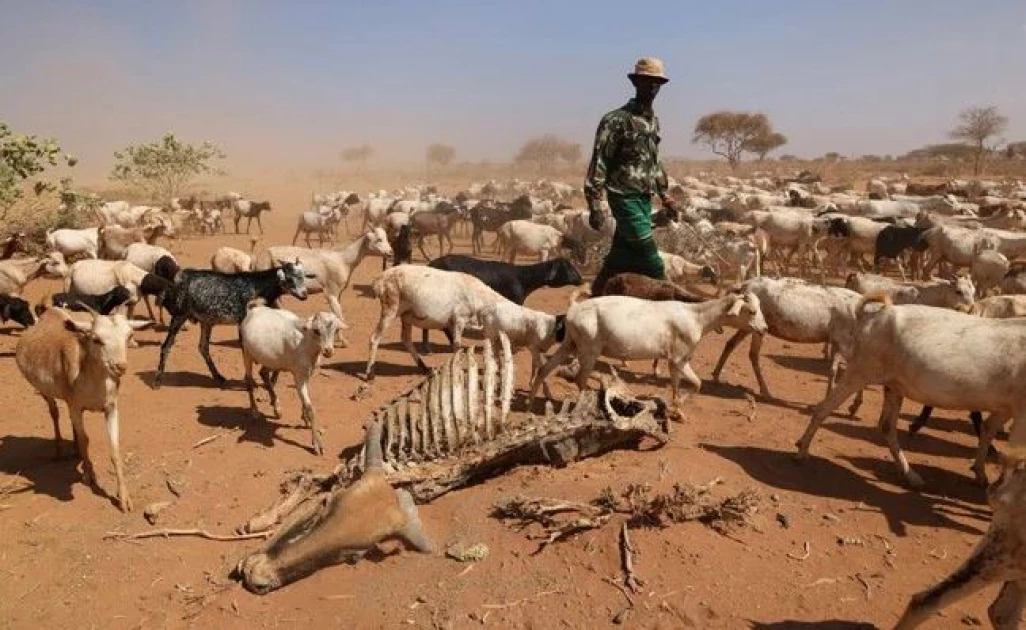What is climate change and why you should care

A shepherd walking his cattle past a carcass in Turkana. PHOTO:COURTESY

Audio By Vocalize
It has subjected 4.35 million people to dire need of food and the number is likely to rise in the coming months.
More than 2.4 million livestock have died and as experts have warned, if the government fails to saddle up then the numbers will increase.
It bears the dreaded, yet renowned, name, Drought.
With the situation taking the form of a vicious annual cycle, weather and drought experts are calling for an overhaul of the drought response mechanisms.
Concern has been raised over the lack of a proactive approach to addressing the drought situation in the country which created another cycle of the increased economic burden in drought mitigation programs, as the years go by.
Global humanitarian organizations have advised that drought-stricken Kenyans need urgent humanitarian assistance in the midst of the country’s fifth failed rainy season.
The March-May 2022 rainy season was the driest on record in the last 70 years and the Kenya Meteorological Department forecasts “drier-than-average conditions” for the rest of the year.
President William Ruto however, has been at the forefront in making efforts to mitigate the ongoing crisis as he recently announced that the Government has made a new allocation of Ksh.2 billion for food relief to counties affected.
He further noted that his Government will collaborate with development partners and the private sector to raise an additional Ksh.10 billion.
The unfortunate ambush by the perennial drought has however not only affected Kenya but the world at large, all attributed to climate change.
The global disaster has seen various stakeholders engage in collaborative efforts to combat climate change ahead of the 2022 United Nations Climate Change Conference (COP 27) set to be held from 6 to 18 November 2022 in Sharm El Sheikh, Egypt.
What is Climate Change?
Starting off with demystifying the stereotypes, most people have defined climate change as change in weather patterns. It is partly true but change in temperatures is only the tip of the iceberg.
Climate change is the long-term shifts in temperatures and weather patterns primarily due to burning fossil fuels like coal, oil and gas. This has also resulted to global warming due to emissions of Chlorofluorocarbons (CFCs) which blanket the Earth and trap the sun’s heat.
The consequences of climate change now include intense droughts, water scarcity, severe fires, rising sea levels, flooding, melting polar ice, catastrophic storms, and declining biodiversity.
Point in case, various parts of the world have suffered from the effects of climate change. For example in Pakistan, where extreme rainfall on the heels of a glacier-melting heat wave, flooded nearly one-third of the country in the summer of 2022.
The flooding turned Pakistan's farm fields into miles-wide lakes that stranded communities for weeks killing 1,700 people.
Australia has had constant forest-fire incidences claiming loss of animal and human lives.
Areas in Canada, United States and Germany have also suffered from excruciating heat waves.
The conundrum has however remained to be why countries in Africa, despite having some of the lowest national greenhouse gas emissions, is home to many of the world's most climate-vulnerable countries.
To deal with climate change, these countries will have to invest in adaptation measures, such as seawalls, climate-smart agriculture and infrastructure that's more resilient to high heat and extreme storms.
Why you should care about Climate Change
Climate change can affect our health, ability to grow food, housing, safety and work.
Speaking exclusively to Citizen Digital, Peter Abwayo from Redcross Kenya noted that Kenyans should take part in combating climate change because it bears an immediate effect on the way of life and the economy.
He said that in Kenya, the drought has greatly caused food insecurity which then implicates a high cost of living.
"Simply we are talking about 2.5 million cattle dying. We get meat from those areas where cattle is lost which causes meat supply to be low so ultimately meat in Nairobi becomes expensive," he said.
If not intervened, Abwayo added, Kenya will continue receiving less rainfall and more people will be afflicted by drought.
He added that they have raised awareness of planting and growing trees with an aim of growing 5 million in the next two years.
"One of the things we have tried to do is to sensitize the public on the importance of climate change. Right now we are supporting the president's plans to plant 5 billion trees in 5 years but before that, we had our plan to grow 5 million trees in the next two years. We are working with schools and communities to actualize this," he said.
Climate change also has harsh effects on human health caused by inhaling greenhouse gases and emissions which can induce stroke and heart attacks by penetrating the lungs and heart and even traveling into the bloodstream.
Andy Haines, a professor of environmental change and public health at the London School of Hygiene and Tropical Medicine, says that air pollution causes anywhere between 3.6 million and nine million premature deaths a year.


Leave a Comment